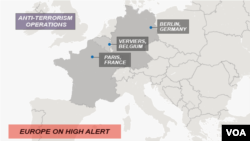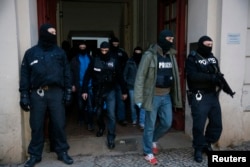In cities across Europe, police are conducting raids and making arrests, striving to ease tensions that have risen exponentially since attacks in and near Paris last week claimed 17 victims.
Cities in Belgium are on heightened alert after two alleged jihadists were killed by security services east of Brussels Thursday, while German security forces raided 12 homes across the country in a counterterrorism operation early Friday morning.
In Paris, a dozen people were arrested early Friday and a train station was evacuated in what police called a "precaution" following an alleged bomb threat. The actions coincided with a visit by U.S. Secretary of State John Kerry, who'd come in a belated show of American solidarity with France.
U.S. President Barack Obama reiterated that support later Friday during a joint press conference with British Prime Minister David Cameron, who has been visiting the White House for two days of talks.
"I know David joins me when I say that we will continue to do everything in our power to help France seek the justice that is needed," Obama told reporters.
Cameron, too, vowed that Britain and its allies will confront terrorism "wherever it appears." Later, he called for preventing safe havens for those promoting "the poisonous message that's perverting Islam."
Obama said the United States and its allies not only must continue fighting violent extremism in Iraq and Syria, but also must develop a counter-narrative to combat homegrown jihadism that "has penetrated communities around the world."
He called for improving intelligence-gathering and, at least as important, engaging with communities, especially those with large immigrant populations.
'Major imminent attack' thwarted
The Belgian federal prosecutors’ office said Thursday's raid in the town of Verviers was directed at a cell of returnees from Syria who had been planning a "major imminent attack" in Belgium. Two of the suspects were shot dead and a third, seriously injured, was taken into custody.
The suspects in the incident in Vergiers, a Belgian town about 80 miles southwest of Brussels, were planning to kill police officers in public and in police stations, the prosecutors’ office said.
Belgian officials said a total of 13 suspects were detained in Belgium while two others were detained in France.
Officials told reporters Friday there is no apparent link to the attacks in France. However, another two suspects were arrested in France. Belgian prosecutors are seeking their extradition, spokesman Eric Van der Sijpt said at a Brussels news conference, according to the AFP news service.
With the arrests, "not only a terror cell but also their support network" have been dismantled, AFP quoted the spokesman as saying.
Similarities among suspects
There are similiarities in the profiles of suspects in the French arrests and with the three assailants who launched last week's Paris-area terrorist attacks, including apparent links to radical Islam in the Middle East.
Terrorism expert Mathieu Guidere of the University of Toulousem said they may also reflect copycat efforts by European jihadists – a sort of one-upsmanship – on the Internet and on the ground.
"The Belgium jihadists are trying to show off on the Internet right now and to post many threats in French and in different languages against Belgium," Guidere said. Their intent is to "say they are able to do the same type of operation that has been conducted in France against Charlie Hebdo," the Paris satirical publication whose staff members were the target of the initial attack on January 7.
In Friday's raids in Germany, police arrested two Turkish citizens.
Martin Steltner, a spokesman for the public prosecutors' office in Berlin, said the two were suspected of involvement in preparations in Syria for a serious, violent crime against the state.
Security services in Britain, Spain and Bulgaria also are looking into possible links between their countries and the three gunmen involved in last week's attacks in France. The assailants, all Islamist extremists, were killed in twin police raids last Friday.
Security responses reconsidered
Speaking to reporters Friday, French Interior Minister Bernard Cazeneuve briefly described the early morning arrests. He also said France remains on high alert, with more than 120,000 police and military personnel deployed around the country.
Authorities acknowledge intelligence mistakes in failing to prevent the attacks. But analyst Guidere said some of the newly implemented security measures will not solve the problem.
"Putting the army around Jewish schools and Jewish places is good psychologically, to reassure these citizens that the government is doing something for them," he said. "But from a security point of view, since we know they [jihadists] target primarily and essentially the military and the Jews, putting these types of measures is nothing more than putting two targets in the same place."
Those arrested around Paris Friday are suspected of having ties to French gunmen Said and Cherif Kouachi and Amedy Coulibaly, who killed 17 people in back-to-back attacks around Paris last week before they were shot dead in twin police raids.
Police and other security teams are reassessing their responses to perceived threats, analysts said.
"Security services have tended to err on the cautious side because they want a case to stick in court," said Shaun Gregory, an international security expert with Britain's Durham University.
"But I suspect they will be intervening earlier perhaps than they would have done," he added, "disrupting plots, trying to roll up a few individuals and also, of course, trying to help the French police and security services with their investigations."
A debate is under way in France on measures to thwart future attacks, with suggestions ranging from better surveillance of the Internet, to de-radicalization programs and efforts to restore order in the country's poor and disaffected suburbs.
In an interview with the Associated Press on Friday, the head of the European Union's police agency, Europol, said Europe must cooperate more closely to prevent attacks like last week's deadly incidents in Paris.
Rob Wainwright said the large number of radicalized Muslim extremists across Europe, plus their lack of command structure and growing sophistication, makes it "extremely difficult" for law enforcement agencies to foil every terrorist attack.
Lisa Bryant contributed to this report from Paris.

















